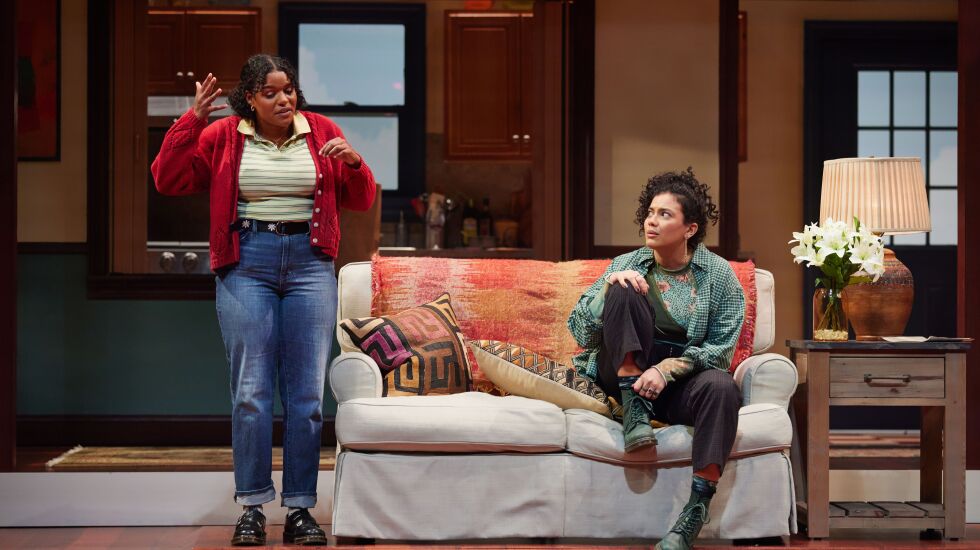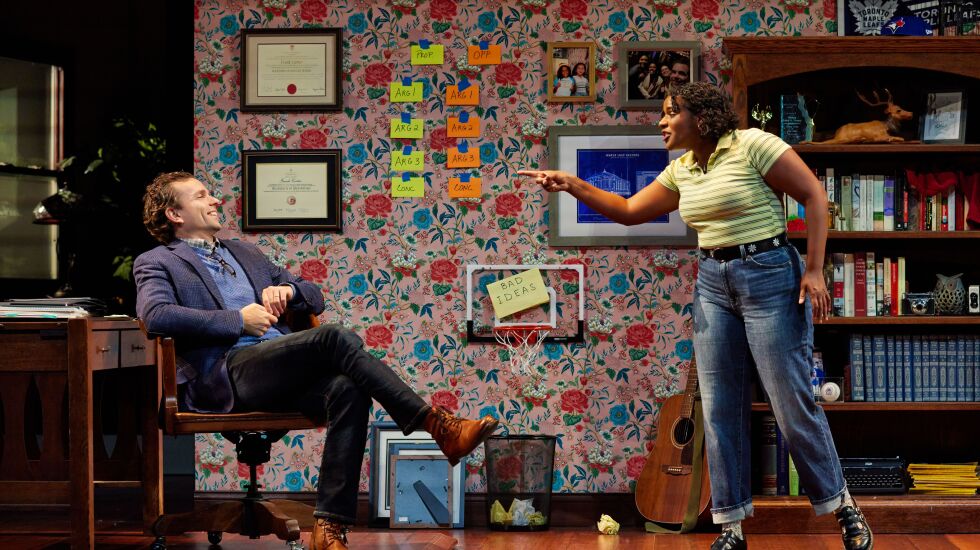
“Life After,” the emotionally intense, sonically intricate new musical from Britta Johnson, opens without much fanfare. There’s just a lone man in a pool of light, leaving a voicemail message for his daughter Alice, asking her to please call back.
In the show’s second number, the teenager learns that shortly after leaving the message, her father died in a car crash.
Every family is messy, but the family in “Life After” is messy in a way that will be instantly recognizable to anyone who has lost a loved one when unfinished business still defined their relationship.
The 90-minute production, running through July 17 at the Goodman Theatre, is only the third major staging of “Life After,” following a 2017 world premiere in Toronto and a U.S. premiere in 2019 at San Diego’s Old Globe Theatre.
Johnson began working on “Life After” more than a decade ago, when she was a teenager trying to cope with her father’s untimely death. The completed work is replete with non-hummable melodies, conversational lyrics and emotional depth, evoking the great Stephen Sondheim.
Director Annie Tippe and music director Chris Kong guide a nine-person ensemble and a live, seven-piece orchestra to melodic highs and dissonant lows. Grief and all of its shattering attendants — rage, confusion, denial, heartache — manifest themselves incrementally, snowballing into a force that will crush Frank’s survivors if they can’t make peace with his flaws.
Frank (Paul Alexander Nolan) ignites the emotional firestorm contained in “Life After,” but the story is centered on Alice (Samantha Williams). Alice is rarely without her clutch of Furies (Ashley Perez Flanagan, Lauryn Hobbs, Chelsea Williams), a trio who provide both a Greek chorus and an alternately hilarious/nightmarish manifestation of the clambering, overwhelming thoughts erupting from Alice’s psyche. Predominant among those thoughts is that she is responsible for her father’s death.
Alice isn’t alone in trying to navigate grief so all-consuming it subsumes reason. Her mother Beth (Bryonha Marie Parham) and sister Kate (Skyler Volpe) struggle over their own troubled, truncated relationships with Frank.

An author and a public speaker who seems a cross between Dale Carnegie and Tony Robbins, Frank traveled the world’s auditoriums dispensing advice in his “Transformotion” conferences. His self-help axioms are mostly cliches about standing on the edge of a new day and learning to forgive yourself. But even at their shallowest, Johnson finds shards of truth at the center of each cliché and hones them to piercing effect.
Tippe’s ensemble meshes into a perfectly imperfect nuclear family. When Alice, Kate and Beth are besieged by strangers bearing food, the bereaved can clearly see the condolence casseroles come with a hefty side of prurience and pity.
The plot moves nimbly as Alice tries to piece together the final hour of her father’s death, with her best friend Hannah (Lucy Panush) serving as a sounding board and, when needed, cheery raconteur.
Alice follows clues — scribbles on an old notepad, a flight number, a seemingly offhand comment from debate coach Ms. Tompkins (Jen Sese) — but none offers closure.
Every character has a similarly relatable journey. In the innocuously titled “Wallpaper,” Parham’s Beth delivers an anthem of joy, love, anger and blazing anguish that’s on a par with “Rose’s Turn,” the iconic five-alarm barnburner from “Gypsy.”
As Alice travels the stages of grief, her vocals color the merciless road she’s on, from “Alice Finds Out,” when she learns of her father’s death, to the benediction-like “Poetry,” when she finally comes to terms, as much as she can, with his memory.
Ann Yee’s choreography veers with grace and precision among the show’s many moods. Tap, modern or ballet-influenced, the movement expresses what the characters feel when words fail them. The cast is backed by an orchestra directed by Kong. The sound, whether hushed a cappella vocal or a lush, soaring string crescendo, is rich, clear and balanced.
Playing out on set designer Todd Rosenthal’s rendition of home surrounded by puffy clouds in a robin’s egg blue sky, “Life After” looks as good as it sounds.
Alice ultimately has to confront the brutal truth that sometimes people leave you halfway through the woods.
“Life After,” on the other hand, will stay with you for a long while.







